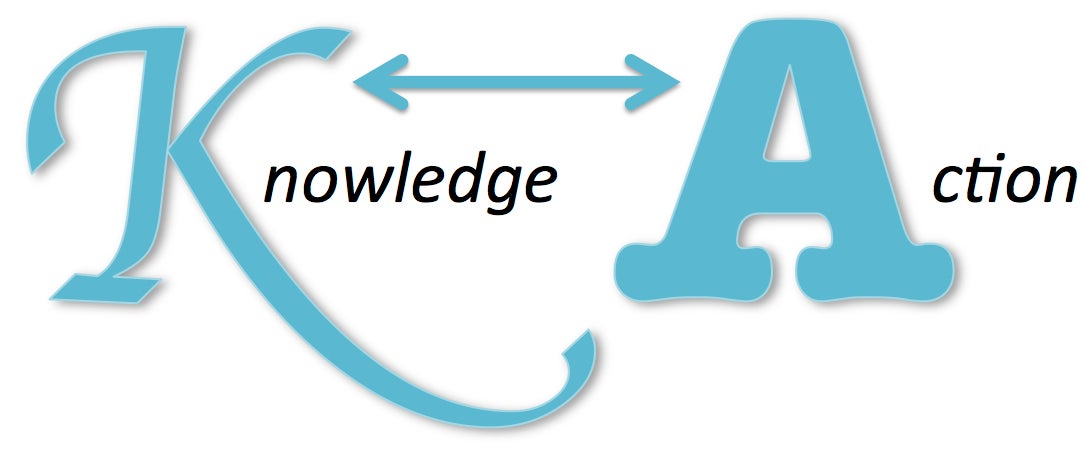The difference between knowledge and action
The relationship between health researcher/scientist and end-users has historically been primarily linear. Scientists conduct a literature review, determine research questions, obtain funding, conduct research and then disseminate findings. Often this last step means presentations at academic conferences or publication in academic journals and is still relatively far removed from end-users. The result is a rising level of concern that there is a gap between “what we know” (science) and “what we do/what we practice” (actions of end-users). To try to close this gap between knowledge and action and to ensure end-users are able to access research findings, there has been increasingly more emphasis being put on the Knowledge Translation (KT) aspect of research (Tetroe, 2007).
In Canada KT is embedded in the mandate of the Canadian Institutes of Health Research (CIHR), meaning researchers must formally address plans for KT before receiving federal funding for health research. The concept of KT emerged in the 1990s, where producers of research “pushed” the research message onto end-users (Lavis et al., 2003), but its meaning has since evolved. CIHR now defines KT as:

...a dynamic and iterative process that includes synthesis, dissemination, exchange and ethically-sound application of knowledge to improve the health of Canadians, provide more effective health services and products and strengthen the health care system. This process takes place within a complex system of interactions between researchers and knowledge users which may vary in intensity, complexity and level of engagement depending on the nature of the research and the findings as well as the needs of the particular knowledge user.
More simply, KT can be understood as knowledge-to-action (Straus, Tetroe & Graham, 2009).
A knowledge production problem?

Despite the evolving definition, the knowledge-to-action gap is typically framed as a knowledge transfer problem (Van de Ven & Johnson, 2006). In other words, a lack of action by the end-user is presumably caused by poor transfer of the appropriate knowledge along that linear relationship between scientist and end-user. Various studies have been conducted along this assumption; some criticize scientists for not creating publically accessible messages (e.g. Beer, 2001), and other studies have focused on factors that prevent end-users from adopting this knowledge (e.g. Grimshaw et al., 2002).
There is, however, an alternative paradigm: the knowledge-to-action gap is created by a knowledge production problem (Van de Ven & Johnson, 2006). That is, the knowledge was being transferred correctly but it was not appropriate or applicable to the end-users and therefore there was no resulting action. A parallel concept called the Type III error exists in epidemiological literature, where one is getting a right answer but not asking the right question (Schwartz & Carpenter, 1999).
Higher quality and relevant research that enacts collaboration with end-users and integrates perspectives of multiple stakeholders should then be key to solving this issue. This has also been conceptualized as knowledge mobilization within the knowledge continuum, an active as opposed to passive form of knowledge movement (Elliott, 2011).
Integrated Knowledge Translation
In line with this, CIHR recognizes that there are two types of KT: “end-of-project KT” which emphasizes dissemination based KT and “integrated KT” in which knowledge is gathered collaboratively between researchers and end-users. However, as Bowen and Graham (2013) outline, integrated KT is commonly only practiced in "some fields for some problems" (e.g.: community based participatory research, indigenous health research, grassroots community projects) – it has not crossed over to other applications in health research. In the context of clinical health or laboratory based research:
...many researchers and practitioners (a) have limited experience with participatory methods; (b) may view such approaches as irrelevant – or even contradictory – to the work they do; and (c) do not have practical examples of how knowledge users could be appropriately engaged in the kind of research they are conducting (Bowen & Graham, 2013: 18).
Bowen and Graham conclude with a call for research on the impact of integrated KT approaches on clinical or health care system outcomes. The GET-FACTS project answers that call by conducting an end-user informed research agenda around food allergies in Canada.
References:
- Beer, M. (2001). Why management research findings are unimplementable: An action science perspective. Reflections, 2(3): 58–65
- Bowen, S. & Graham, I.D. (2013) Integrated knowledge translation. In S. Straus, J. Tetroe & I.D. Graham (Ed.), Knowledge translation in Health Care: Moving from Evidence to Practice, 2nd Edition. (pp. 14-21). John Wiley & Sons.
- Elliott, S. J. (2011). The transdisciplinary knowledge journey: a suggested framework for research at the water-health nexus. Current Opinion in Environmental Sustainability, 3(6), 527-530.
- Grimshaw, J. M., Eccles, M. P., Walker, A. E., & Thomas, R. E. (2002). Changing physicians' behavior: what works and thoughts on getting more things to work. Journal of Continuing Education in the Health Professions, 22(4), 237-243.
- Lavis, J., Ross, S., McLeod, C. & Gildiner, A. (2003). Measuring the Impact of Health Research. Journal of Health Services Research and Policy 8:165–70.
- Schwartz, S., & Carpenter, K. M. (1999). The right answer for the wrong question: consequences of type III error for public health research. American Journal of Public Health, 89(8), 1175-1180.
- Straus, S. E., Tetroe, J., & Graham, I. (2009). Defining knowledge translation. Canadian Medical Association Journal, 181(3-4), 165-168.
- Tetroe, J. (2007). Knowledge Translation at the Canadian Institutes of Health Research: A Primer. FOCUS: A Technical Brief From the National Center for the Dissemination of Disability Research, 18. Available at: http://www.ktdrr.org/ktlibrary/articles_pubs/ncddrwork/focus/focus18/Focus18.pdf
- Van de Ven, A. H., & Johnson, P. E. (2006). Knowledge for theory and practice. Academy of management review, 31(4), 802-821.